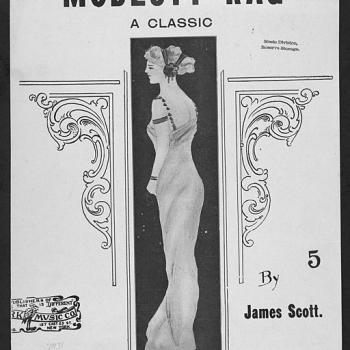If I have been largely silent on the subject of contraception, it has been for two main reasons.
Firstly, while I am comfortable with Catholic teaching on the matter, I tend to see it as a secondary issue. Or to say it another way, I am personally uncomfortable with artificial birth control – much as I am with artificiality in general, or with the drive to control every aspect of our lives, including life itself – and I see its connections to some disturbing social trends (which will be explained more below); and yet it does not disturb me at the same level as, say, abortion, or any other direct violence.
The other reason is that it is simply difficult to find something substantial to say when so few statements on the subject, whether for or against, manage to get past the level of superficial and excessively confrontational “culture wars” that only serve to galvanize the convinced and unconvinced alike in their respective positions.
Because of this, I’ve sometimes thought of myself as a secret believer in Catholic teaching about artificial birth control. Call it cowardice if you will, and perhaps you will not be entirely wrong. But a variety of women at Catholic Sistas have provided reasons worth sharing, which go well beyond culture-war rhetoric and are not accompanied by a crusader’s battle cry. They explicitly state that they are providing their own reasons for not using birth control rather than trying “to force others to follow what we believe.” And the reasons they give are disarmingly substantial.
The full list is linked above, but I’d like to highlight a few interrelated themes running through it that I find particularly compelling.
First, there is the objection to treating pregnancy and/or fertility as a disease (which, though they don’t mention this, is an attitude that also relates to gender-based disparities in health insurance premiums: since we are capable of becoming pregnant, being female is a “pre-existing condition”).
- “Because my fertility shouldn’t be treated like a disease and medicated away.”
- “Because I am not sick or broken.”
- “Because fertility is not a pathology.”
- “Because being fertile isn’t a condition that needs to be medicated.”
- “Because it is the first ‘medicine’ of its kind to be prescribed to be taken to address a normally functioning process of the human body.”
Then there are concerns about what is natural, organic, and healthy. A couple of years ago I wrote about a friend of mine who connected her aversion to birth control and preference for organic food quite unselfconsciously, and the article Catholic Sistas links to from the health-conscious website MindBodyGreen speaks to the same concerns from an entirely secular perspective and is worth a read in its own right.
- “Because I spend too much time and money on organic, non-GMO and hormone free foods to fill my body with hormonal birth control.”
- “Because I don’t want any foreign objects placed inside my body to prevent it from working.”
- “Because regularly shooting my body up with extra hormones would make it a lot harder to be a reasonable, thoughtful, and logical human being.”
- “Because I really don’t think it’s healthy for my body to think it is perpetually pregnant.”
- “Because we like our sex environmentally friendly.”
- “Because I care too much about my body and the environment to pollute either one with carcinogens.”
And then there is the in-depth, long-view approach to health care, seeking to avoid the impulse toward band-aids and quick-fixes that goes along with our society’s tendency to overmedicate, in some cases creating a “cure” that is worse than the “disease”.
- “Because I deserve actual health care and healing, not just a band aid.”
- “Because I like to fix things, not mask the symptoms.”
- “Because there are natural ways of dealing with hormone imbalances that don’t mask the symptoms, but get straight to the cause.”
- “Because I don’t want a short-term solution that will cause long-term problems.”
A few of the reasons given also touch on the commodification of children (related to the broader reduction of human beings in general to an economic or consumeristic value standard).
- “Because I cannot imagine one of my children not existing.”
- “Because siblings are a gift.”
- “Because I don’t want my children to ever think I didn’t want them.”
And a few of them have a feminist overtone, critiquing the sexual objectification of women or the idea that women must pass as men to be equals with men.
- “Because I don’t need to turn off my womanhood in order to be a feminist.”
- “Because it perpetuates the objectification of women as worthless sexual objects, constantly at the disposal of men in our commodity driven culture.”
- “Because I don’t need to turn off my womanhood in order to be a strong, progressive, modern woman.”
True, there are a few reasons given that are not as well stated as these: “Because it is against my religion” really doesn’t say anything about the why, and one statement pointing out the incoherence of ingesting all those chemicals while complaining about “large pharmaceutical corporations and hormones in your meat” could be read as a cheer for the same inconsistency the other way. But these are exceptions in a substantial and thought-provoking list. Dare I hope that this could be the sort of thing to begin a conversation that may get us past reductionism and stereotypes on either side?
















